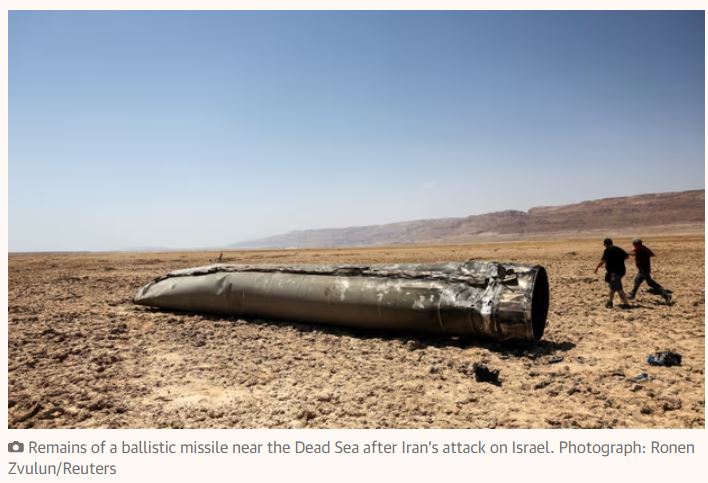
The country is on the defensive. While Israel has ironclad support from its allies, Tehran is vulnerable and isolatedMon 22 Apr 2024 11.13 BSTShare
Tit-for-tat confrontation between Israel and Iran has sparked concerns about escalation dragging the Middle East into all-out war. Such a scenario remains unlikely because neither Israel nor Iran would benefit from full-on conflict. But while Israel is feeling emboldened, Iran is on the defensive.
Iran’s main interest is self-preservation. It wants to protect its nuclear facilities inside Iran, and its assets in the Middle East, mainly the armed groups it supports, the most valuable of which is Hezbollah. Iran’s leadership continues to claim that it neither directed nor was informed about Hamas’s attack on Israel on 7 October, because they do not want Israel and its allies to target it, or to retaliate in a way that would erode Iran’s influence in the region.
Regardless of the nature of Iran’s involvement in Hamas’s unprecedented assault, the country is a key financial and military backer of Hamas and bears part of the responsibility for Hamas’s actions. Iran is also the sponsor of several militia organisations operating across the Middle East, including the Houthis in Yemen, Hezbollah in Lebanon, and myriad armed groups in Syria and Iraq. In the aftermath of 7 October, and with Iran’s blessing, those proxies have been actively involved in anti-Israeli military activities.
None of those other proxies has deployed great resources in the ongoing fight with Israel; all have kept their involvement limited. Coupled with Iran’s persistent rhetoric distancing itself from responsibility for the events of 7 October, the narrow scope of action by those Iran-backed groups shows that Iran is in a defensive rather than offensive position. It is increasingly realising how susceptible it is to a regime-threatening attack by Israel at a time when it does not have the capacity to engage in all-out war.
While Israel is engaged in a full-scale assault on Hamas, which has caused vast devastation in Gaza, it is responding to attacks by Iran’s other proxies through strategic retaliation. Its strikes have specifically targeted and killed almost 300 Hezbollah fighters. In Syria, Israel has been attacking weapons warehouses and military bases of Iran-backed groups. The damage caused by Israel in those attacks far exceeds the cost Iran-backed proxies have inflicted on Israel.
This strategic retaliation shows that Israel does not need to use all-out force to try to weaken Iran-backed groups in places such as Syria and Lebanon. In Lebanon, Israel has managed to hit Hezbollah commanders while they travel in vehicles and during meetings in village houses. In showing that it has knowledge of Iran-connected targets and the means to reach them, Israel is sending a powerful message to Iran about its exposure to Israeli intelligence and surveillance. This significantly limits the extent to which Iran will be willing to escalate its involvement in war against Israel.
Iran’s vulnerability was further emphasised as Israel’s allies, including the US and the UK, took part in the defence operation against Iran’s projectile attack on Israel on 13 April. While Israel can boast having such ironclad external support, Iran and its proxies are basically alone.

Tehran and its proxies are keen to save face. After 7 October, Iran whipped up its proxies to act because their supporters and opponents alike expected them to do something after such a dramatic move by Hamas. They could have increased the pressure on Israel through significant collective action, but Iran did not ask them to pursue this route. Iran’s main motivation behind their involvement is to present an image of itself as the leader of the so-called “axis of resistance” standing up to Israel, the US and their allies.
Saving face is also partly why Iran chose to attack Israel by drones and missiles on 13 April in retaliation for Israel’s attack in Damascus on 1 April, which targeted an annexe of the Iranian consulate and killed at least seven Islamic Revolutionary Guard Corps (IRGC) commanders and officials. Iran had not engaged in high-level retaliation after the US assassinated IRGC commander Qassem Soleimani in Iraq in 2020; Iran indicated then that it was adopting strategic patience in determining how and when to respond. Israel’s 1 April attack was the biggest provocation of Iran since Soleimani’s killing and was aimed at pressuring Iran further, knowing that Iran could not use strategic patience again as an excuse for not responding.
Israel is fighting on four fronts – but the defeat may come at homeRead more
Recognising its limitations, Iran’s telegraphed retaliation on 13 April served to show Israel what Iran can do, but without pushing Israel too much. The White House statement about Iran’s 13 April attack did not include Lebanon in the list of countries where Iran-backed groups took part in the attack (only Iraq, Syria and Yemen were mentioned alongside Iran). Iran knew that Hezbollah’s involvement in that particular episode would spark an escalation it wants to avoid and risk undermining its most important regional asset.
Iran’s downplaying of the subsequent attack on Isfahan on 19 April, widely attributed to Israel, is in line with its desire to limit direct confrontation with Israel. Iran knows that in targeting Isfahan, near nuclear facilities, Israel is sending it a message about what Israel can do and where it can reach.
It is myopic to assess Iran’s position mainly through the prism of the cycle of retaliations of April 2024. The big picture shows that Iran’s hands are tied. Israel will continue to take advantage of this vulnerability to embarrass Iran further and try to gradually cripple its proxies.
- Lina Khatib is director of the Soas Middle East Institute and associate fellow at the Middle East and North Africa programme at Chatham House












 Posted in
Posted in 











